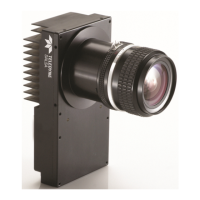
Do you have a question about the Teledyne DALSA P3-80-12k40-00-R and is the answer not in the manual?
| Frame Rate | 40 kHz |
|---|---|
| Interface | Camera Link |
| Line Rate | 40 kHz |
| Power Requirements | 12V DC |
| Operating Temperature | 0°C to 50°C |
Key features of the Piranha 3 camera, including resolution, line rates, and output options.
Technical specifications for the Piranha 3 camera, detailing pixel pitch, camera size, and performance metrics.
Detailed performance specifications covering sensor, optical, mechanical, and electrical interfaces.
Overview of the Piranha 3's image sensor technology and pixel readout structure.
Graphs illustrating the typical Piranha 3 responsivity across different wavelengths.
Step-by-step guide for setting up the Piranha 3 camera and its system components.
Details on camera connectors, power input, and diagnostic LED status indicators.
Pinout and configuration details for the Camera Link interface.
Information on control inputs accepted by the camera via the Camera Link connector.
Signals indicating valid data output from the camera for acquisition systems.
Default serial communication settings for controlling the camera via ASCII protocol.
Guidelines for formatting commands, including parameter separators and character acceptance.
Procedure for setting the serial communication port's baud rate for camera control.
How to access command lists and parameter information via the serial interface.
Categorization and listing of available camera commands for user reference.
Controls for exposure mode, line rate, and exposure time generation.
Configuration options for Camera Link mode, throughput, and pretrigger settings.
Details on region of interest settings and analog/digital signal processing chains.
Mechanical drawings and specifications for P3-80 and P3-87 camera models.
Information on lens mount options and back focal distance for Piranha 3 cameras.
Guidelines for illumination, light sources, filters, and lens modeling for optimal imaging.
Calculations for lens magnification and their relationship to image resolution.
General steps for identifying and resolving common connection and signal issues.
Methods for verifying camera communications, parameters, and settings via serial interface.
Troubleshooting steps for specific issues like no output, erratic behavior, or line dropouts.
Technical overview of Low Voltage Differential Signaling used in Camera Link.
Definitions for signals used in the Camera Link interface, including data and control signals.
Explanation of video data transmission and enable signals within the Camera Link protocol.
Details on reserved LVDS pairs for general-purpose camera control signals.
Information on asynchronous serial communication characteristics via Camera Link.
Notes on camera power supply requirements and connector specifications.
Table of warning and error messages with descriptions and possible causes.
Comprehensive list of camera commands with syntax, parameters, and descriptions.